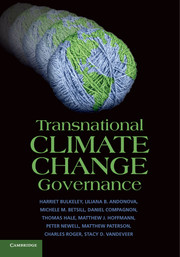Book contents
- Frontmatter
- Contents
- List of Figures and Tables
- Acknowledgements
- Acronyms and Abbreviations
- 1 Introducing Transnational Climate Change Governance
- 2 Mapping the World of Transnational Climate Change Governance
- 3 Theoretical Perspectives on Transnational Governance
- 4 Origins, Agency and the Forms of Transnational Climate Change Governance
- 5 Constructing Transnational Climate Change Governance Issues and Producing Governance Spaces
- 6 The Uneven Geography of Transnational Climate Change Governance
- 7 Understanding Authority and Legitimacy in Transnational Climate Change Governance
- 8 Making a Difference? Tracing the Effects and Effectiveness of Transnational Climate Change Governance
- 9 Conclusions – Looking Beyond Transnational Climate Change Governance
- References
- Index
1 - Introducing Transnational Climate Change Governance
Published online by Cambridge University Press: 05 August 2014
- Frontmatter
- Contents
- List of Figures and Tables
- Acknowledgements
- Acronyms and Abbreviations
- 1 Introducing Transnational Climate Change Governance
- 2 Mapping the World of Transnational Climate Change Governance
- 3 Theoretical Perspectives on Transnational Governance
- 4 Origins, Agency and the Forms of Transnational Climate Change Governance
- 5 Constructing Transnational Climate Change Governance Issues and Producing Governance Spaces
- 6 The Uneven Geography of Transnational Climate Change Governance
- 7 Understanding Authority and Legitimacy in Transnational Climate Change Governance
- 8 Making a Difference? Tracing the Effects and Effectiveness of Transnational Climate Change Governance
- 9 Conclusions – Looking Beyond Transnational Climate Change Governance
- References
- Index
Summary
Whose responsibility is it to tackle climate change? ‘Everyone’s and no one’s’, we might glibly reply. Responsibility is diffused across scales, social groups, sectors, countries and generations. The causes of climate change are implicated in everyday acts of production and consumption and relate to the ways in which societies organise their transportation, housing, energy, water and food systems. Recognising the complex and diffuse agencies and authorities that address climate change, the world of climate politics is no longer limited to the activities of national governments, international organisations and interstate bargaining between states. Increasingly, subnational governments, non-governmental organisations, businesses and individuals are taking responsibility into their own hands, experimenting with bold new approaches to the governance of climate change (Betsill & Bulkeley 2004; Andonova, Betsill & Bulkeley 2009; Selin & VanDeveer 2009b; Bulkeley & Newell 2010; Hoffmann 2011; Bulkeley et al. 2013). The governance of climate change now takes a seemingly bewildering array of forms: carbon markets, certification standards, voluntary workplace schemes, emissions registries, carbon labelling, urban planning codes and so on. Critical to this transformation of the politics of climate change has been the emergence of new forms of transnational governance that cut across traditional state-based jurisdictions, operate across public-private divides and seek to develop new approaches and techniques through which responses are developed. What sets these initiatives apart from other forms of transnational relations is how they not only influence others, but also how they directly intervene in the governing of global affairs in ways that defy conventional understandings of international relations.
- Type
- Chapter
- Information
- Transnational Climate Change Governance , pp. 1 - 16Publisher: Cambridge University PressPrint publication year: 2014
- 4
- Cited by



